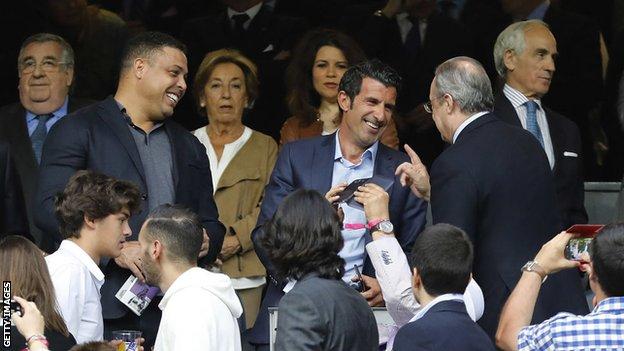Anyone who believes the spectacular climbdown by football’s elite signals the end of the road for European Super League plans does not begin to understand the mindset of Florentino Perez, one of the scheme’s main proponents.
In a way, we’ve been here before. This is not the first time Perez has attempted a radical reinvention of just how football should be marketed around the world – and only the most naive believe it will be his last.
In 2000 Perez stood for election as Real Madrid president on the wild, seemingly unachievable pledge he would bring Luis Figo from main rivals Barcelona to the Bernabeu. Furthermore, he claimed if he failed to do so he would personally pay the membership fees of all the club’s season-ticket holders the following season.
Perez had convinced Figo’s agent to sign a contract containing a prohibitive clause with financial penalties that would have enabled him to do precisely that if he was elected and the Portuguese winger’s move fell through. If they backed out of the deal, Figo’s side agreed to pay Real Madrid (in what was then pesetas) an amount equivalent to about £26.2m, which was basically the total cost of season tickets for a year.
It was not as reckless an agreement as one might imagine because at the time Figo was looking to improve his terms with Barcelona. What better way, thought his agent, to strengthen his hand than by threatening Barcelona? What were the chances of Perez winning the election anyway? He’d been defeated in an earlier run for the role and the club, under the presidency of Lorenzo Sanz, had won the Champions League that year and also two years earlier in 1998.
For Real Madrid, it was a win/win. The poaching of Barcelona’s talisman opened past wounds at Barcelona about Madrid stealing Alfredo di Stefano from under the noses of the Catalans in 1953. Perez won the election and Figo’s goose was cooked.

The arrival of Figo was just a tasty starter for the banquet of riches about to come Real Madrid’s way as Perez set about making the club the biggest and one of the wealthiest in the world by bringing in its best and most expensive players. It was a recreation of Disney, a big brand that owned – and attracted – the biggest brands, in this case the likes of Zinedine Zidane and David Beckham.
The fact it didn’t totally succeed on the pitch became almost irrelevant. Perez, at one point, suggested Beckham could play right-back and Zidane centre-back to make way for other ‘Galacticos’, a term the players deeply disliked as it made them sound more like business assets than footballers.
Much of their time, particularly in the vital pre-season period, was spent promoting the club, meeting sponsors, ‘pressing the flesh’, rather than getting in the right sort of shape to face a tough campaign. On one such tour, one player remarked that “getting to actually play a game felt like we were having a day off”.
The chickens finally came home to roost in the 2003-04 Champions League quarter-final against Monaco. Real Madrid won the first leg 4-2 but as the players were walking off at half-time of the second leg with the score at 1-1, a despairing Zidane turned to France and Monaco winger Ludovic Giuly and said: “We are all knackered.” Real Madrid lost 3-1 and went out.
Perez’s Galactico policy had taken Real Madrid from the verge of bankruptcy and turned the club into a global brand. On the pitch, they failed to win a major trophy for the three seasons after winning the league in 2003. It mattered not a jot. Perez was re-elected in 2004 with 94.2% of the vote.